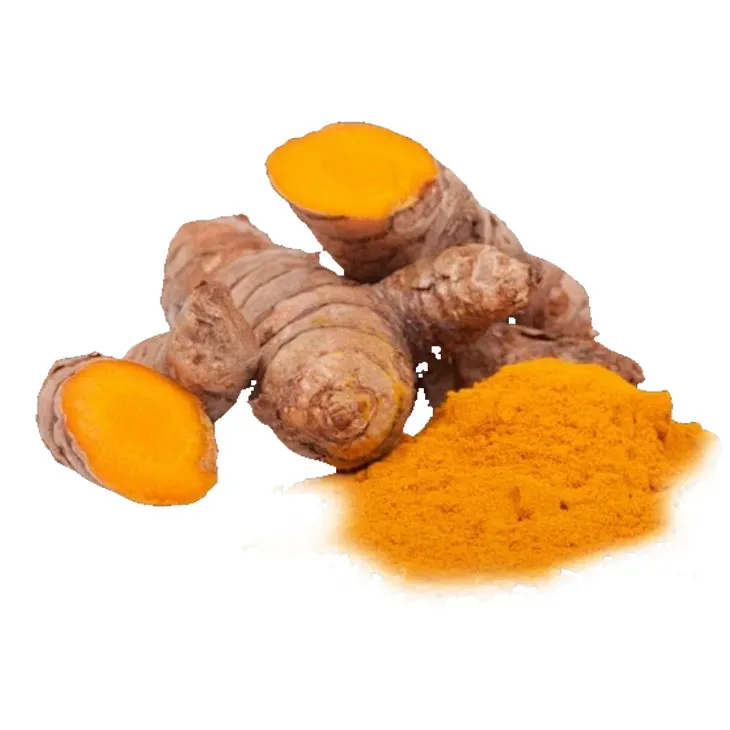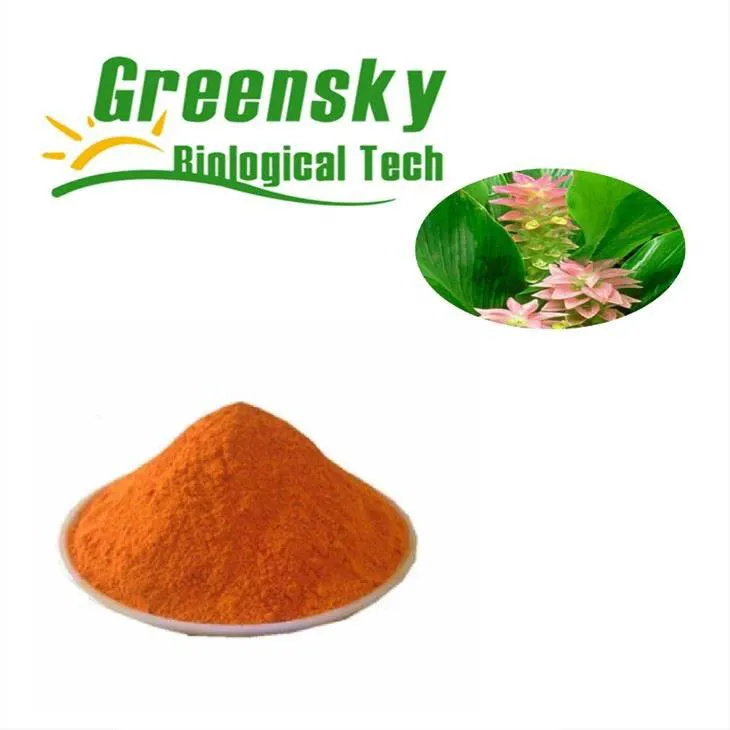- 0086-571-85302990
- sales@greenskybio.com
10 Amazing Health Benefits of Curcumin.
2024-11-13

1. Anti - Inflammatory Properties
Curcumin is renowned for its powerful anti - inflammatory effects. Chronic inflammation is at the root of many diseases, including arthritis, heart disease, and certain cancers. The body's natural inflammatory response is crucial for fighting off infections and healing wounds. However, when this response becomes chronic, it can be harmful.
Curcumin inhibits the activity of various inflammatory molecules in the body, such as cytokines and enzymes like cyclooxygenase - 2 (COX - 2). By reducing inflammation, it can potentially alleviate the symptoms of inflammatory conditions. For example, in arthritis patients, Curcumin may help reduce joint pain and swelling. Studies have shown that it can be as effective as some anti - inflammatory drugs, but with fewer side effects.

2. Antioxidant Activity
Our bodies are constantly exposed to free radicals, which are unstable molecules that can damage cells and DNA. This oxidative stress is linked to aging, cancer, and neurodegenerative diseases. Curcumin acts as a potent antioxidant, neutralizing free radicals and protecting the body from their harmful effects.
It has the ability to scavenge a wide variety of free radicals, including superoxide, hydroxyl, and peroxyl radicals. This antioxidant activity helps maintain the integrity of cells and tissues. Moreover, curcumin can also enhance the body's own antioxidant defense systems, such as increasing the activity of antioxidant enzymes like superoxide dismutase (SOD) and glutathione peroxidase.

3. Heart Health Improvement
There are several ways in which curcumin can benefit heart health. Firstly, it helps in reducing inflammation in the blood vessels, which is a major risk factor for heart disease. By decreasing the levels of inflammatory markers in the bloodstream, it can lower the risk of atherosclerosis, the build - up of plaque in the arteries.
Secondly, curcumin can also improve lipid profiles. It may help in reducing LDL (low - density lipoprotein) cholesterol, also known as "bad" cholesterol, and increasing HDL (high - density lipoprotein) cholesterol, or "good" cholesterol. Additionally, it has been shown to have anti - platelet properties, which means it can prevent the abnormal clotting of blood in the arteries, reducing the risk of heart attacks and strokes.

4. Cancer Prevention and Treatment
Although more research is needed, curcumin has shown promising potential in cancer prevention and treatment. It can interfere with the various stages of cancer development. In the initiation stage, curcumin can protect cells from DNA damage caused by carcinogens.
During the promotion and progression stages of cancer, curcumin can inhibit the growth and spread of cancer cells. It does this by interfering with multiple signaling pathways within cancer cells that are involved in cell growth, survival, and metastasis. Some studies have also suggested that curcumin may enhance the effectiveness of chemotherapy and radiotherapy while reducing their side effects.

5. Brain Health and Neuroprotection
Curcumin has significant implications for brain health. It can cross the blood - brain barrier, which is a protective barrier that restricts the entry of many substances into the brain. Once in the brain, curcumin exerts its neuroprotective effects.
It has been studied for its potential in preventing and treating neurodegenerative diseases such as Alzheimer's and Parkinson's. In Alzheimer's disease, curcumin may help reduce the accumulation of amyloid - beta plaques, which are characteristic of the disease. It can also reduce inflammation in the brain and improve cognitive function. In Parkinson's disease, curcumin may protect dopaminergic neurons from damage.

6. Digestive Health Promotion
Curcumin can have a positive impact on the digestive system. It can stimulate the production of bile in the liver, which aids in the digestion and absorption of fats. This can be beneficial for those with digestive disorders such as indigestion or gallbladder problems.
Additionally, curcumin has anti - microbial properties in the gut. It can help in maintaining a healthy balance of gut microbiota by inhibiting the growth of harmful bacteria and promoting the growth of beneficial ones. This is important as an imbalance in gut microbiota has been linked to various health problems, including inflammatory bowel diseases and metabolic disorders.
7. Diabetes Management
For diabetes patients, curcumin may offer several benefits. It can help in improving insulin sensitivity. Insulin is a hormone that regulates blood sugar levels, and when cells become resistant to insulin, it can lead to high blood sugar levels. Curcumin can enhance the body's response to insulin, thereby helping to control blood glucose levels.
Moreover, curcumin can also reduce inflammation in the pancreas, which is the organ responsible for producing insulin. By reducing inflammation, it may protect the beta cells in the pancreas that are involved in insulin production. Some studies have also suggested that curcumin may have a role in preventing the development of type 2 diabetes.
8. Skin Health Enhancement
The antioxidant and anti - inflammatory properties of curcumin make it beneficial for skin health. It can protect the skin from damage caused by UV radiation, pollution, and free radicals. This can help in preventing premature aging of the skin, such as the formation of wrinkles and age spots.
Curcumin can also be used to treat various skin conditions. For example, it has been shown to be effective in reducing the symptoms of psoriasis, an autoimmune skin disorder characterized by red, scaly patches on the skin. It can also help in treating acne by reducing inflammation and killing the bacteria that cause acne.
9. Immune System Boost
A strong immune system is essential for fighting off infections and diseases. Curcumin can enhance the immune system in several ways. It can stimulate the activity of immune cells such as macrophages, which are responsible for engulfing and destroying foreign invaders like bacteria and viruses.
Additionally, curcumin can modulate the immune response, preventing it from overreacting or underreacting. This balance is crucial for maintaining optimal health. By strengthening the immune system, curcumin can help the body better resist infections and recover more quickly from illness.
10. Joint Health Support
As mentioned earlier, curcumin has anti - inflammatory properties, which are highly beneficial for joint health. In conditions like osteoarthritis and rheumatoid arthritis, the joints become inflamed, causing pain, stiffness, and reduced mobility.
Curcumin can reduce the inflammation in the joints, relieving pain and improving joint function. It can also slow down the progression of joint damage in some cases. This makes it a natural alternative or complementary treatment for those suffering from joint problems.
In conclusion, curcumin is a remarkable compound with a wide range of health benefits. From reducing inflammation and protecting against oxidative stress to potentially preventing and treating various diseases, it has a lot to offer for overall health and well - being. However, it's important to note that while curcumin shows great promise, more research is still needed to fully understand its mechanisms of action and to optimize its use in medical and health applications.
FAQ:
What is curcumin?
Curcumin is a natural compound. It is the main active ingredient in turmeric, which gives turmeric its characteristic yellow color. It has been used in traditional medicine for centuries and has attracted significant scientific attention in recent years due to its various potential health benefits.
How does curcumin reduce inflammation?
Curcumin has anti - inflammatory properties. It can inhibit certain molecules in the body that are involved in the inflammatory response, such as cytokines and enzymes like cyclooxygenase - 2 (COX - 2). By interfering with these inflammatory mediators, curcumin helps to reduce inflammation at the cellular level.
Can curcumin really improve heart health?
Yes, it can. Curcumin may improve heart health in several ways. It can help to lower cholesterol levels, reduce blood pressure, and prevent the oxidation of LDL (bad) cholesterol. These effects contribute to a reduced risk of heart disease.
Is curcumin safe to consume?
When consumed in normal amounts as part of a balanced diet or in supplement form within recommended dosages, curcumin is generally considered safe for most people. However, some individuals may experience mild side effects such as digestive discomfort. High - dose supplements may also interact with certain medications, so it's advisable to consult a healthcare provider before starting any new supplement regimen.
How can one incorporate curcumin into their diet?
One can incorporate curcumin into their diet by using turmeric in cooking. Turmeric can be added to curries, soups, stews, and even smoothies. There are also curcumin - rich supplements available in the form of capsules or tablets for those who prefer a more concentrated intake.
Related literature
- The Anti - Inflammatory Properties of Curcumin"
- "Curcumin and Heart Health: A Review of the Evidence"
- "Beneficial Effects of Curcumin on Overall Health"
- ▶ Hesperidin
- ▶ Citrus Bioflavonoids
- ▶ Plant Extract
- ▶ lycopene
- ▶ Diosmin
- ▶ Grape seed extract
- ▶ Sea buckthorn Juice Powder
- ▶ Fruit Juice Powder
- ▶ Hops Extract
- ▶ Artichoke Extract
- ▶ Mushroom extract
- ▶ Astaxanthin
- ▶ Green Tea Extract
- ▶ Curcumin
- ▶ Horse Chestnut Extract
- ▶ Other Product
- ▶ Boswellia Serrata Extract
- ▶ Resveratrol
- ▶ Marigold Extract
- ▶ Grape Leaf Extract
- ▶ New Product
- ▶ Aminolevulinic acid
- ▶ Cranberry Extract
- ▶ Red Yeast Rice
- ▶ Red Wine Extract
-
Mangosteen extract powder
2024-11-13
-
Pine bark Extract Powder
2024-11-13
-
Hops Extract
2024-11-13
-
Propolis Extract Powder
2024-11-13
-
Scutellaria Extract
2024-11-13
-
Lemon Balm Extract
2024-11-13
-
Genistein
2024-11-13
-
Cassia Seed Extract
2024-11-13
-
Tamarind extract powder
2024-11-13
-
Lily extract
2024-11-13





















